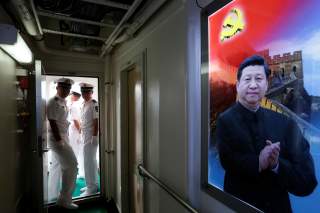How China Controls Its Citizens
China is zombifying ostensibly regulatory-type international institutions in an effort to spread its pro-Party message.
If technical innovation and artistic creativity is causally-linked to free society with the development of autonomous citizens, then American industries, media conglomerates, and educational institutions are allowing China to outsource its national creativity while retaining a politically-oppressive system domestically. This is obvious in the case of American surveillance companies providing the high-tech know-how to sustain and deepen the Party’s police state in Xinjiang as well as in the large numbers of party-state-supported STEM students studying in American graduate schools and interning in American laboratories and research centers. More subtle is the willing provision specially-party-tailored versions of the products of an innovative, free society. Anyone who has used China’s lackluster Baidu search engine to do research knows how off-point most of the findings are. The same is true of Baidu maps (i.e., walking into a wall) versus Google Maps (i.e., finding your destination). The price free society pays for the type of creativity that created these excellent platforms is having to tolerate (and be informed by) one another’s discordant voices. With its the help of American industry, Chinese society can stay restricted and still have full access to the products of innovation and creativity (minus the free expression), even relying on American innovation to find new ways to keep the safe space safe. In other words, the products of a free society are re-purposed to de-universalize the norm of free expression. If the Chinese people want to get accurate search results and not walk into walls, they should demand freedom from their government—and, in fact, recent events suggest they would.
America’s educational institutions pushed back hard against America’s own armed forces when they disagreed with the Department of Defense’s policy towards LGBT soldiers. These universities could refuse to accept large numbers of students who have party-state-funded scholarships, decline to renew Confucius Institutes, refuse to sell themselves to Chinese-owned companies, be more careful about the organizations on campus, and keep a more watchful eye when Chinese students are bullied on campus by other Chinese.
Federal and state governments should commit to robustly funding the humanities and social sciences with public money, at least robustly funding China regional and linguistic education, giving full academic freedom to the universities. For other American hosts of Chinese “discourse power,” the lack of public outrage can be partly explained by the fact that these important American institutions are low key in their dealings with China. The public should openly debate the merits and dangers in their actions and the government should consider potential regulatory measures. A recent change in U.S. government tone more critical of China could serve as needed catalyst to begin addressing the problem. For instance, the U.S. government was right to call out the Chinese ordering all international airlines to reclassify Taiwan as “Orwellian nonsense.”
Because America is a free society, this change in tone need not automatically lead to characterizing China as an enemy. Rather, it should spur on the many voices of America’s civil society in conjunction with government actors to consider how best to reaffirm liberal-democratic values and norms while engaging on friendly terms with a party-state that understands those values as fatal to its very existence.
Eugene (John) Gregory, JD, PhD is a lieutenant colonel in the U.S. Army. He is director of the Chinese Academic Program in the Department of Foreign Languages at the United States Military Academy and director of the Center for Languages, Cultures, and Regional Studies ([email protected]).
The views expressed here are the author’s personal views and do not necessarily reflect those of the Department of Defense, the U.S. Army, the U.S. Military Academy, or any other department or agency of the U.S. government.

